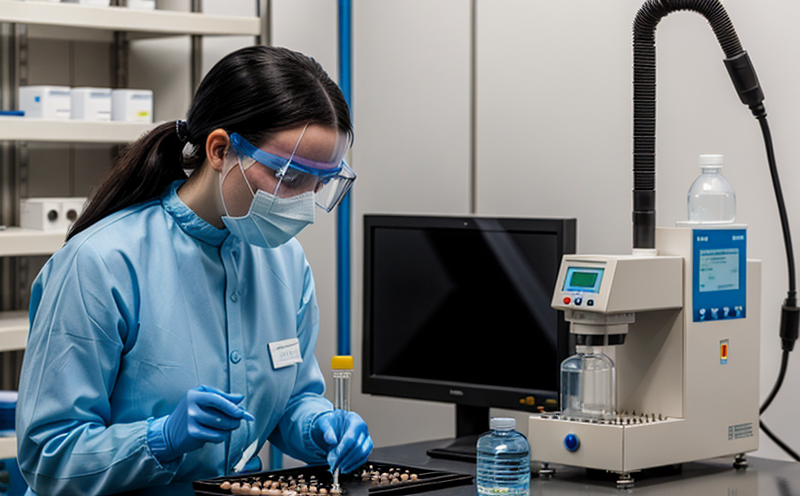LC MS Extractables Testing from Packaging
The demand for pharmaceutical products is increasing, and with it comes an ever-greater need to ensure the safety of these products. One crucial step in this process is ensuring that packaging materials used do not introduce harmful substances into the final product during storage or transportation. LC (Liquid Chromatography) MS (Mass Spectrometry) Extractables Testing from Packaging addresses exactly this concern by identifying and quantifying potential contaminants, such as extractable organic compounds, plasticizers, or leachable metals.
LC MS is a powerful analytical technique that allows for the separation of complex mixtures into individual components. Coupled with Mass Spectrometry, it provides structural information about these components, making it an essential tool in pharmaceutical testing. This service specifically targets extractables from packaging materials, which can include containers like vials and syringes, as well as closures and seals.
The process begins with the selection of appropriate solvents that mimic real-world conditions under which packaging is likely to come into contact with a drug product. Common solvents used in this testing include water, ethanol, methanol, or combinations thereof. Once extracted, these samples are analyzed using LC MS to identify and quantify potential contaminants.
The primary goal of LC MS Extractables Testing from Packaging is not only compliance but also the continuous improvement of product safety and quality. By identifying potential issues early in the development process, pharmaceutical companies can take corrective actions before products reach the market, reducing risks associated with adverse events or recalls.
When selecting a laboratory for this service, it’s important to consider factors such as experience with pharmaceutical testing, state-of-the-art instrumentation, and expertise in interpreting complex LC MS data. Our team of experienced scientists specializes in pharmaceutical testing and employs advanced technologies like UPLC (Ultra Performance Liquid Chromatography) coupled with high-resolution Q-TOF MS (Quadrupole Time-of-Fly Mass Spectrometry).
Our approach to LC MS Extractables Testing from Packaging ensures both accuracy and reliability. We follow international standards such as USP , ICH Q2B, and FDA guidelines when conducting these tests. The results are presented in detailed reports that include not only the quantitative data but also interpretations of potential risks based on industry knowledge.
Understanding the scope of this testing is vital for ensuring compliance with regulatory requirements. Extractables can be organic or metallic compounds depending on the nature of the packaging material. Commonly tested materials include polyethylene terephthalate (PET), high-density polyethylene (HDPE), and aluminum foil used in vial closures.
Preparing specimens correctly is critical to obtaining accurate results from LC MS Extractables Testing from Packaging. Specimens are prepared by exposing the packaging material to a solvent for a specified time, then filtering the solution through a fine filter before analysis. The choice of solvent plays a significant role in determining which extractable species will be detected.
The instrumentation used in this testing is highly sophisticated and includes UPLC systems equipped with various detectors like UV, ELSD (Evaporative Light Scattering Detector), or FLD (Fluorescence Detection). Coupled with high-resolution Q-TOF MS instruments, these tools provide detailed structural information about the extracted compounds. Advanced software packages allow for data processing, interpretation, and reporting.
The acceptance criteria for LC MS Extractables Testing from Packaging vary based on regulatory requirements and product specifications. Generally, any detected extractable above a certain threshold is considered non-compliant unless proven safe through additional testing or justification. Compliance with these criteria ensures that the packaging does not introduce harmful substances into the drug product.
Quality and reliability are paramount in pharmaceutical testing, especially when it comes to ensuring patient safety. Our commitment to excellence in LC MS Extractables Testing from Packaging is reflected in our rigorous quality control measures and adherence to best practices outlined by leading organizations like ISO, ICH, FDA, and USP.
Quality and Reliability Assurance
- Use of state-of-the-art UPLC systems coupled with high-resolution Q-TOF MS for accurate data.
- Compliance with international standards like USP , ICH Q2B, and FDA guidelines.
- Data processing using advanced software packages to ensure reliable results.
- Rigorous quality control measures to maintain consistent performance across all tests.
Customer Impact and Satisfaction
The impact of LC MS Extractables Testing from Packaging extends beyond regulatory compliance; it significantly enhances customer satisfaction by ensuring the highest level of product safety. By identifying potential contaminants early in the development process, pharmaceutical companies can address issues before they affect patients. This proactive approach builds trust with healthcare providers and consumers alike.
Our service also contributes to long-term business success by helping clients meet regulatory expectations and avoid costly delays or recalls. By providing accurate and reliable data, we enable our customers to make informed decisions about their packaging choices, ultimately leading to better outcomes for all stakeholders involved in the pharmaceutical supply chain.
International Acceptance and Recognition
The acceptance of LC MS Extractables Testing from Packaging is widespread among regulatory bodies worldwide. Organizations such as the US FDA, European Medicines Agency (EMA), and World Health Organization (WHO) have recognized the importance of this testing in ensuring drug product safety.
Our laboratory’s adherence to international standards ensures that our results are widely accepted by these agencies. By meeting or exceeding their requirements, we help pharmaceutical companies navigate complex regulatory landscapes confidently. This recognition not only enhances credibility but also facilitates smoother interactions with global partners and stakeholders.





